|
|
|
Sort Order |
|
|
|
Items / Page
|
|
|
|
|
|
|
| Srl | Item |
| 1 |
ID:
167409
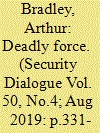

|
|
|
|
|
| Summary/Abstract |
This article proposes a political prehistory of drone theory that traces its juridico-political evolution from the 17th century to the present day. To outline my argument, I construct a constellation between Hobbes’s theory of sovereign punishment in Leviathan and Chamayou’s critique of drone warfare in Drone Theory to illuminate the political origins of drone violence. First, I argue that Hobbes’s social contract theory lays the conceptual groundwork for Chamayou’s drone theory. Second, I contend that Hobbes’s theory of the sovereign punishment of domestic citizens preempts Chamayou’s critique of drone warfare against foreign enemies. Finally, I speculate that Hobbes’s theory of punishment is founded upon a sacrificial paradigm that returns in the phenomenon of domestic drone strikes. In summary, I argue that Hobbes might be something close to the first drone theorist insofar as his political theory systematically produces the state of exception between citizen and enemy in which the drone operates today. What, then, are the theoretical origins of drone warfare? How does the punishment of citizens prefigure drone warfare against foreign enemies? To what extent might even citizens themselves be a species of drone who may be activated by the sovereign at any point?
|
|
|
|
|
|
|
|
|
|
|
|
|
|
|
|
| 2 |
ID:
167408
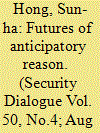

|
|
|
|
|
| Summary/Abstract |
This article examines invocations of the future in contemporary security discourse and practice. This future constitutes not a temporal zone of events to come, nor a horizon of concrete visions for tomorrow, but an indefinite source of contingency and speculation. Predictive, preemptive and otherwise anticipatory security practices strategically utilize the future to circulate the kinds of truths, beliefs, claims, that might otherwise be difficult to legitimize. The article synthesizes critical security studies with broader humanistic thought on the future, with a focus on the sting operations in recent US counter-terrorism practice. It argues that the future today functions as an ‘epistemic black market’, a zone of tolerated unorthodoxy where boundaries defining proper truth-claims become porous and flexible. Importantly, this epistemic flexibility is often leveraged towards a certain conservatism, where familiar relations of state control are reconfirmed and expanded upon. This conceptualization of the future has important implications for standards of truth and justice, as well as public imaginations of security practices, at a time of increasingly preemptive and anticipatory securitization.
|
|
|
|
|
|
|
|
|
|
|
|
|
|
|
|
| 3 |
ID:
167411
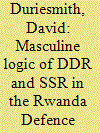

|
|
|
|
|
| Summary/Abstract |
Since the 1994 genocide and civil war, the Rwandan government has implemented an externally funded disarmament, demobilization and reintegration/security sector reform (DDR/SSR) programme culminating in the consolidation of armed groups into a new, professionalized Rwanda Defence Force. Feminists argue that DDR/SSR initiatives that exclude combatant women and girls or ignore gendered security needs fail to transform the political conditions that led to conflict. Less attention has been paid to how gendered relations of power play out through gender-sensitive DDR and SSR initiatives that seek to integrate women and transform hyper-masculine militarized masculinities. This article investigates how Rwanda’s DDR/SSR programme is governed by an oppressive masculine logic. Drawing on critical studies on men and masculinities and feminist work on peacebuilding, myths and the politics of belonging, it argues that Rwanda’s locally owned DDR/SSR programme places the military and militarization at the centre of the country’s nation-building programme. Through various ‘boundary-construction’ practices, the Rwandan government attempts to stabilize the post-1994 gender order and entrench the hegemony of a new militarized masculinity in Rwandan society. The case study draws on field research conducted in 2014 and 2015 and a discourse analysis of historical accounts, policy documents and training materials of the Rwanda Defence Force.
|
|
|
|
|
|
|
|
|
|
|
|
|
|
|
|
| 4 |
ID:
167410
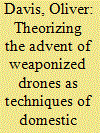

|
|
|
|
|
| Summary/Abstract |
The killing of Micah Johnson by Dallas police using a teleguided exploding robot on 8 July 2016 is the first known example of the use of a killer drone by US law enforcement in the domestic arena. This repatriation of the drone, under conditions of racialized urban unrest designated as exceptional, was predicted by Didier Bigo and follows a familiar pattern whereby coercive security technologies are tested abroad before finding their way ‘home’ to arm police forces that are becoming increasingly paramilitary in style and conduct. I use the Dallas incident to probe the cogency and limits of ‘drone theory’ and to consider its application in domestic policing contexts. I work through three broadly delineated areas of scepticism about drone theory as it intersects with policing and, in so doing, develop my own account of the weaponized policing drone as a defining techno-cultural element within the emergent form of neoliberal political rationality I call ‘governance’.
|
|
|
|
|
|
|
|
|
|
|
|
|
|
|
|
| 5 |
ID:
167407
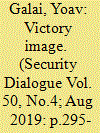

|
|
|
|
|
| Summary/Abstract |
This article interrogates the concept of the ‘victory image’ in Israel as a militarized visual economy. What began as a visual illustration of warfighting became an integral part of operational considerations. My own contribution as an embedded photographer to that economy is used as a prism for larger changes in visual politics. These changes relate to the proliferation of an actuarial gaze as the overarching ordering principle of imaging in the subsequent Gaza Wars. Instead of celebratory images of military achievements, Israeli officials opted for information visualizations to convey a sense of achievement, allowing for the continuation of the ‘visual economy,’ but with Palestinian victims of indiscriminate attacks ignored.
|
|
|
|
|
|
|
|
|
|
|
|
|
|
|
|
|
|
|
|
|